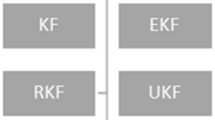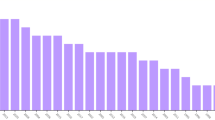Abstract
System identification based on least mean square (LMS) adaptive filters is effective due to their simplicity and robustness. Inherent physical characteristic of intended system usually make nonnegativity constraint desirable. In other words, imposing nonnegativity constraint on optimization problem leads to more feasible unknown parameter estimation. Hence, nonnegative least mean square (NNLMS) and its variants were proposed to adaptively solve the Wiener filtering problem considering constraint that makes filter weights nonnegative. In this paper, we propose a new variant of nonnegative least mean square for which its performance is analyzed both theoretically and experimentally. The proposed algorithm behavior is investigated in sparse system identification by Monte Carlo simulations in order to show validation of analysis and theory models. We compare our method with IP-NNLMS and NNLMS in order to prove the advantage of our proposed algorithm. Our proposed algorithm is also used in classification problem, and it is compared with entropy function-based online adaptive decision fusion (EADF) algorithm.





Similar content being viewed by others
References
Ljung, L.: System Identification. Wiley Online Library, New York (1999)
Chen, D., Plemmons, R.J.: Nonnegativity constraints in numerical analysis. Birth Numer. Anal. 10, 109–140 (2009)
Jahromi, M.N., Salman, M.S., Hocanin, A., Kukrer, O.: Mean-square deviation analysis of the zero-attracting variable step-size LMS algorithm. Signal Image Video Process. 11(3), 533–540 (2017)
Moir, T.: FIR system identification for correlated noise using the convolution matrix, an investigation. Signal Image Video Process. 10(6), 1049–1054 (2016)
Liu, W., Pokharel, P.P., Principe, J.C.: The kernel least-mean-square algorithm. IEEE Trans. Signal Process. 56(2), 543–554 (2008)
Gunay, O., Toreyin, B.U., Kose, K., Cetin, A.E.: Entropy-functional-based online adaptive decision fusion framework with application to wildfire detection in video. IEEE Trans. Image Process. 21(5), 2853–2865 (2012)
Figueiredo, M.A., Nowak, R.D., Wright, S.J.: Gradient projection for sparse reconstruction: application to compressed sensing and other inverse problems. IEEE J. Select. Top. Signal Process. 1(4), 586–597 (2007)
Nascimento, V.H., Zakharov, Y.V.: RLS adaptive filter with inequality constraints. IEEE Signal Process. Lett. 23(5), 752–756 (2016)
Ma, W., Chen, B., Qu, H., Zhao, J.: Sparse least mean p-power algorithms for channel estimation in the presence of impulsive noise. Signal Image Video Process. 10(3), 503–510 (2016)
Aliyu, M.L., Alkassim, M.A., Salman, M.S.: A p-norm variable step-size LMS algorithm for sparse system identification. Signal Image Video Process. 9(7), 1559–1565 (2015)
Chen, J., Richard, C., Bermudez, J.-C.M., Honeine, P.: Variants of non-negative least-mean-square algorithm and convergence analysis. IEEE Trans. Signal Process. 62(15), 3990–4005 (2014)
Calamai, P.H., Moré, J.J.: Projected gradient methods for linearly constrained problems. Math. Program. 39(1), 93–116 (1987)
Theodoridis, S., Slavakis, K., Yamada, I.: Adaptive learning in a world of projections. IEEE Signal Process. Mag. 28(1), 97–123 (2011)
Lin, C.-J.: On the convergence of multiplicative update algorithms for nonnegative matrix factorization. IEEE Trans. Neural Netw. 18(6), 1589–1596 (2007)
Chen, J., Richard, C., Bermudez, J.C.M., Honeine, P.: Nonnegative least-mean-square algorithm. IEEE Trans. Signal Process. 59(11), 5225–5235 (2011)
Chen, J., Bermudez, J.C.M., Richard, C.: Steady-state performance of non-negative least-mean-square algorithm and its variants. IEEE Signal Process. Lett. 21(8), 928–932 (2014)
Chen, J., Richard, C., Bermudez, J.C.M.: Reweighted nonnegative least-mean-square algorithm. Signal Process. 128, 131–141 (2016)
Chen, J.: System identification under non-negativity constraints—applications in adaptive filtering and hyper spectral image analysis. Signal and Image Processing. Université de Technologie de Troyes (2013)
Khattri, S.K.: New close form approximations of ln (1+ x). Teach. Math. 12(1), 7–14 (2009)
Kalogiratou, Z., Simos, T.: Newton–Cotes formulae for long-time integration. J. Comput. Appl. Math. 158(1), 75–82 (2003)
Minkoff, J.: Comment on the unnecessary assumption of statistical independence between reference signal and filter weights in feedforward adaptive systems. IEEE Trans. Signal Process. 49(5), 1109 (2001)
Author information
Authors and Affiliations
Corresponding author
Rights and permissions
About this article
Cite this article
Shokrolahi, S.M., Jahromi, M.N. Logarithmic reweighting nonnegative least mean square algorithm. SIViP 12, 51–57 (2018). https://doi.org/10.1007/s11760-017-1129-0
Received:
Revised:
Accepted:
Published:
Issue Date:
DOI: https://doi.org/10.1007/s11760-017-1129-0




